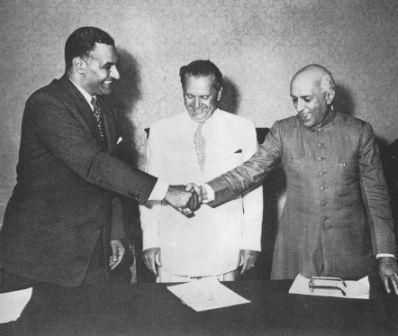 The term "Non-Alignment" was coined by V K Menon in his speech at UN in 1953 which was later used by Indian Prime Minister, Jawaharlal Nehru during his speech in 1954 in Colombo, Sri Lanka. In this speech, Nehru described the five pillars to be used as a guide for Sino-Indian relations, which were first put forth by Chinese Premier Zhou Enlai. Called Panchsheel (five restraints), these principles would later serve as the basis of the Non-Aligned Movement. The five principles were:
The term "Non-Alignment" was coined by V K Menon in his speech at UN in 1953 which was later used by Indian Prime Minister, Jawaharlal Nehru during his speech in 1954 in Colombo, Sri Lanka. In this speech, Nehru described the five pillars to be used as a guide for Sino-Indian relations, which were first put forth by Chinese Premier Zhou Enlai. Called Panchsheel (five restraints), these principles would later serve as the basis of the Non-Aligned Movement. The five principles were:
- Mutual respect for each other's territorial integrity and sovereignty
- Mutual non-aggression
- Mutual non-interference in domestic affairs
- Equality and mutual benefit
- Peaceful co-existence
Jawaharlal Nehru's concept of nonalignment brought India considerable international prestige among newly independent states that shared India's concerns about the military confrontation between the superpowers and the influence of the former colonial powers. New Delhi used nonalignment to establish a significant role for itself as a leader of the Third World in such multilateral organizations as the United Nations (UN) and the Nonaligned Movement. The signing of the Treaty of Peace, Friendship, and Cooperation between India and the Soviet Union in 1971 and India's involvement in the internal affairs of its smaller neighbors in the 1970s and 1980s tarnished New Delhi's image as a nonaligned nation and led some observers to note that in practice, nonalignment applied only to India's relations with countries outside South Asia.
The movement had its origins in the 1947 Asian Relations Meeting in New Delhi and the 1955 Asian-African Conference in Bandung, Indonesia. India also participated in the 1961 Belgrade Conference that officially established the Nonaligned Movement, but Jawaharlal Nehru's declining prestige limited his influence. In the 1960s and 1970s, New Delhi concentrated on internal problems and bilateral relations, yet retained membership in an increasingly factionalized and radicalized movement. During the contentious 1979 Havana summit, India worked with moderate nations to reject Cuban president Fidel Castro's proposition that "socialism" (that is, the Soviet Union) was the "natural ally" of nonalignment.
